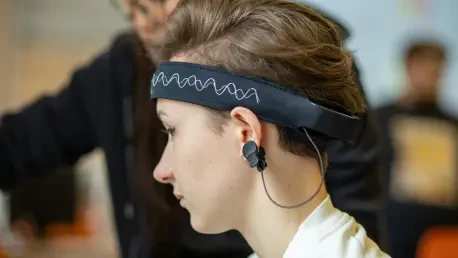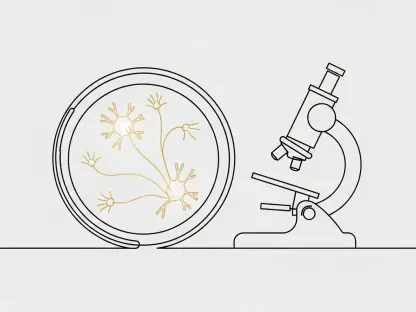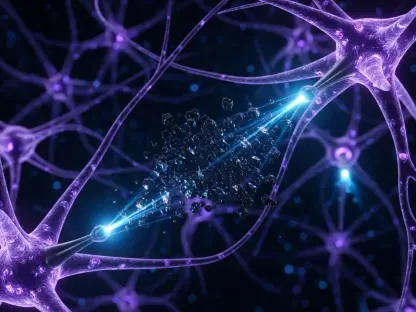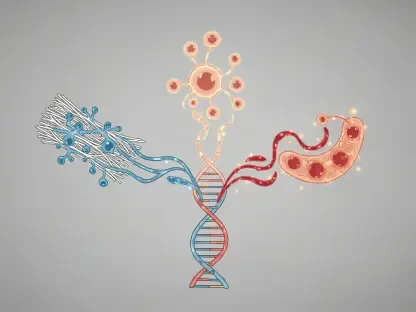Schizophrenia and severe mental illnesses present daunting challenges for the medical community, often leading to a fragmented understanding of their neurological underpinnings. This dilemma has inspired significant research efforts, one of the most revolutionary being the Living Brain Project spearheaded by Dr. Alexander W. Charney at Mount Sinai. This groundbreaking initiative challenges long-held conventions in neuroscience by focusing on the analysis of living brain tissue to offer new insights into psychiatric disorders.
Pioneering Approach in Neuroscience
Decades of neuroscientific research have relied almost exclusively on postmortem brain samples, leaving many questions about living brain dynamics unanswered. The Living Brain Project shifts this paradigm by emphasizing living brain tissue examination, an approach that has already revealed that around 80% of genes express differently in living versus deceased tissue. This revelation prompts a fundamental reassessment of previous findings in the field and opens doors to understanding the brain’s functioning more comprehensively.
Dr. Charney’s journey began with a focus on bridging the knowledge gap between molecular neuroscience and psychiatry, particularly driven by his work with patients diagnosed with schizophrenia. The transition from theoretical research to direct clinical application marked a significant evolution in his career, guided by a commitment to resolve the real-world challenges faced by individuals with severe mental illnesses. This shift aligns with a broader movement toward translational research that directly impacts patient care.
Advanced Methodologies and Recent Discoveries
The adoption of innovative methodologies characterizes the Living Brain Project, where traditional research techniques are complemented by modern tools. The project utilizes the sequencing of living tissues, incorporating artificial intelligence and machine learning to decipher complex psychiatric conditions. These advanced technologies facilitate discoveries in psychiatric genomics and multi-omics analysis, propelling neuroscience into a new era of data-driven inquiry.
Dr. Charney’s research also emphasizes precision medicine’s potential, especially illustrated by his co-direction of the Mount Sinai Million Health Discoveries Program, which collaborates with Regeneron Genetics Center to sequence the genomes of one million participants. This endeavor, part of one of the largest precision medicine initiatives, aims not only to advance scientific knowledge but also to ensure equitable healthcare by focusing on underrepresented populations. The integration of such diverse and widespread data accelerates the understanding of genetic influences on mental health.
Addressing Disparities and Enhancing Applications
The implications of Dr. Charney’s findings extend beyond theoretical advancements, impacting clinical practices and societal approaches to healthcare. By providing more accurate models for psychiatric disorders, the project influences treatment development and offers hope for more effective therapeutic interventions. Emphasizing precision medicine and equitable health solutions underscores the commitment to overcoming disparities in medical research and application.
Dr. Charney’s work also highlights the urgent need for reproducible and verifiable scientific inquiry in a field often challenged by crises of reproducibility. He advocates for adherence to foundational principles of research integrity, urging scientists to prioritize genuine solution-oriented research over personal accolades. This call resonates with ongoing discussions within the scientific community about maintaining high standards of scientific validation.
Innovative Leadership and Personal Reflections
Dr. Charney’s leadership and vision have set a precedent for future research in neuroscience and psychiatry. His adaptability during the COVID-19 pandemic, where he refocused his laboratory efforts toward immediate healthcare needs, is a testament to his innovative mindset. By turning crisis situations into opportunities for progression, Dr. Charney exemplifies a new wave of scientists capable of balancing career objectives with public service.
Balancing intense scientific endeavors with personal passions such as sea kayaking and playing his guitar, Dr. Charney represents a model of how creativity can complement scientific pursuits. This holistic approach encourages scientists to maintain a balance between professional challenges and personal well-being, fostering both innovation and inspiration.
Transforming the Future of Mental Health Research
In summary, the Living Brain Project emerges as a beacon of transformative research, reshaping the landscape of neuroscience and psychiatry. Its focus on living tissue and integration of AI-driven methodologies promise to advance our understanding of complex mental health conditions significantly. Dr. Charney’s approach not only challenges existing paradigms but also proposes a new model for future scientific inquiry—one centered on clinical applicability and equity, paving the way for enduring breakthroughs in mental health treatment.









